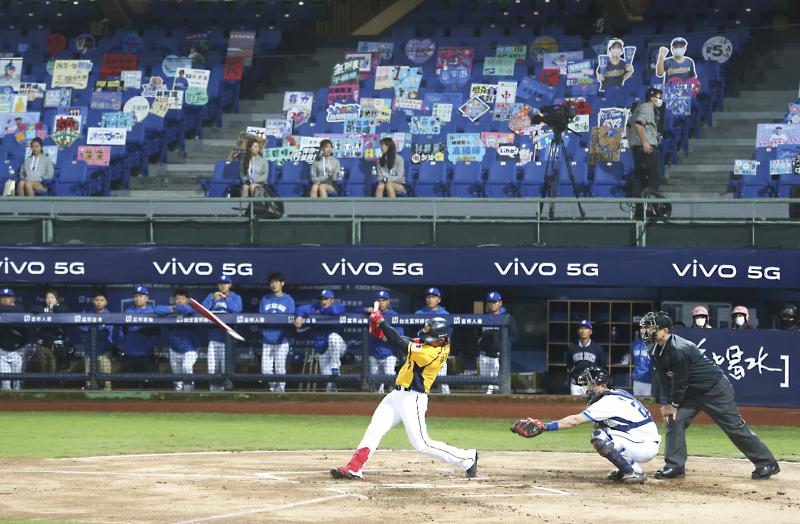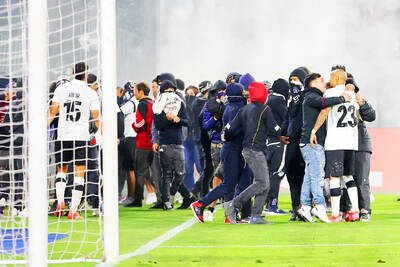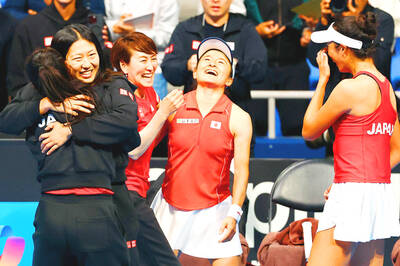When Wang Wei-chen had a base hit for the CTBC Brothers, no one booed or cheered from the stands at the Sinjhuang Baseball Stadium in New Taipei City, no one hurled insults at the umpires, and no one yelled the Chinese-language line of encouragement “add oil” to either team.
The 12,150 blue plastic seats on Friday night were devoid of fans for the game between the CTBC Brothers and the Fubon Guardians, down from the average crowd of 6,000 at local professional baseball games. No fans have come to any local games since play started on April 11.
The five-team CPBL is barring spectators over concerns of spreading COVID-19 in a crowded space, but the league decided it was safe to let in players, coaches, cheerleaders, costumed mascots, mask-wearing batboys and the media, as the nation has relatively few cases of the coronavirus.

Photo: Chiang Ying-ying, AP
“We’d like to have fans coming into the stadium to cheer us on, yet due to the outbreak, they can’t,” said Wang, an infielder for the Brothers. “We are still lucky, since we have not stopped our season and people can still see us in this way.”
Other baseball leagues around the world have been postponed to next month or later. Beyond baseball, organized sports worldwide have canceled or delayed competition. The Tokyo Olympic Games have been pushed back a year.
At the ballpark, about 150 placards were placed upright on the seats. They wished luck to particular players from the Guardians home team, some with cut-out effigies, and thanked the nation’s medical personnel for keeping coronavirus caseloads low.
Rock ‘n’ roll sounds blasted out of the bleachers as if in a normal game and players did some cheering for their teammates to replace the din of fans.
“I think it feels like a real game,” said Mac Huang, a longtime baseball fan and middle-school teacher in Taipei who follows the league online.
Games with no fans are “a good way to stop the coronavirus, but no one knows when the pandemic will stop — and it’s good to have the games on anyway,” he said.
League officials delayed the season twice from its originally scheduled opening day on March 14, and only started competition after close consultation with the Ministry of Health and Welfare.
They are ready to allow all 240 regular games in empty parks through the season’s end in the middle of November, if needed.
“We have to be grateful to Taiwan’s citizens for keeping the outbreak under control and letting us do this,” league commissioner Wu Chih-yang said.
To keep fans watching on their smartphones, PCs and TVs, the league is encouraging teams to give their stadiums a realistic, lively feel. That is where the placards and cheerleaders come in.
Online game commentary is being broadcast in English as well as Chinese this year, in case fans overseas want to watch a live season.
“Because there is so much room up there in the stands, it leaves space for creativity and each team can be creative as it wishes,” the commissioner said.
Teams are still making some money from broadcast games, as the league charges a subscription fee for online viewers, he added.
In Taoyuan, the unbeaten Rakuten Monkeys are charming fans by placing 40 mannequins in the stands — to be sent to local stores once their duties are done — and stadium seats support LED-lit display boards that twinkle with slogans to inspire base hits and home runs.
“The fact that we’re playing in front of empty seats, that’s fine. We’re still playing the game, getting the opportunity to come out here and play,” said Rob Ducey, a former Major League outfielder who is a hitting coach for the Guardians.

Two people died on Thursday after fans and police clashed outside the Estadio Monumental in Santiago ahead of a game in South America’s Copa Libertadores, Chilean authorities said. The fatalities happened shortly before the match between Chile’s Colo-Colo and Brazilian club Fortaleza, when police blocked about 100 fans when they attempted to enter the stadium. There were conflicting accounts of how the fatalities occurred, with local media reporting that one of the dead was a 13-year-old boy. The other victim was an 18-year-old woman, according to a relative at the hospital where she was treated. The fans died after being caught underneath a

College basketballer Kaitlyn Chen has become the first female player of Taiwanese descent to be drafted by a WNBA team, after the Golden State Valkyries selected her in the third and final round of the league’s draft on Monday. Chen, a point guard who played her first three seasons in college for Princeton University, transferred to the University of Connecticut (UConn) for her final season, which culminated in a national championship earlier this month. While at Princeton, Chen was named the Ivy League tournament’s most outstanding player three times from 2022 to last year. Prior to the draft, ESPN described Chen as

College basketballer Kaitlyn Chen (陳凱玲) has become the first player of Taiwanese descent to be drafted by a WNBA team, after being selected by the Golden State Valkyries in the third and final round of the league's draft yesterday. Chen, a point guard who played her first three seasons in college for Princeton University, transferred to the University of Connecticut (UConn) for her final season, which culminated in a national championship on April 6. While at Princeton, Chen was named the Ivy League tournament's most outstanding player three times from 2022 to last year. Prior to the draft, ESPN described Chen as a

Japan yesterday secured a second consecutive Billie Jean King Cup finals appearance with a 2-1 win over 2023 champions Canada, thanks to Ena Shibahara and Shuko Aoyama’s 6-3, 5-7, 6-2 win over Kayla Cross and Rebecca Marino in the qualifying doubles decider. Shibahara and Aoyama powered through the opening set 6-3, breaking twice for a quick 3-0 lead. Cross and Marino hit back in the second, edging it 7-5 to level the match, before the Japanese pair regained control in the third. Canada’s 18-year-old Victoria Mboko edged Shibahara 6-4, 6-7 (8/10), 7-5 in a marathon opening clash. Mboko fired eight aces to